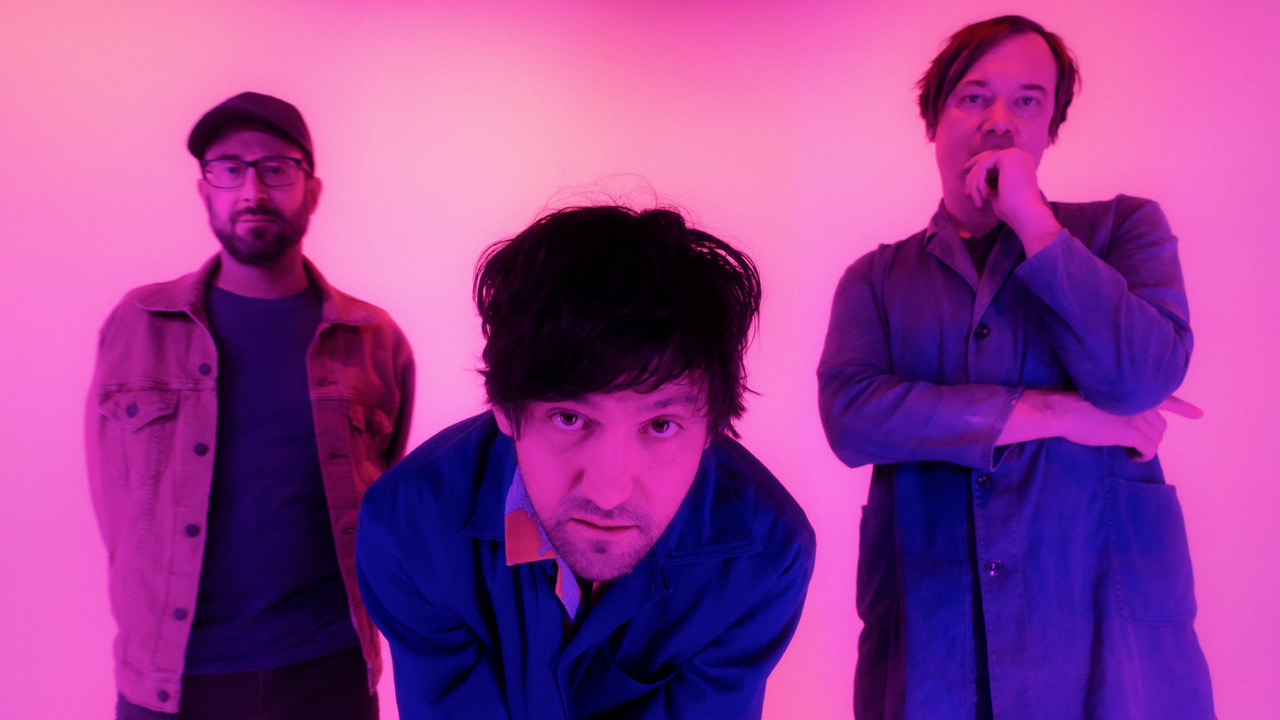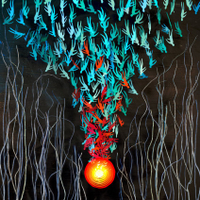Bright Eyes’ first music together in nine years is not so much a comeback as a reemergence from a traumatic cocoon. The culmination of two years’ work, Down In The Weeds, Where The World Once Was, is a complicated, beautiful record that returns to Bright Eyes’ hallmarks while exploring new territory. It’s a homecoming, for both the band and the fans who’ve been patiently waiting.
After almost a decade of working on other projects, Conor Oberst, Mike Mogis and Nate Walcott teased their not-quite-reunion on social media in January of this year. With the help of a new label, the hip Dead Oceans (also belonging to Oberst’s sometime-colleague, Phoebe Bridgers) they announced a number of tour dates and dropped the huge, triumphant Persona Non Grata, with bagpipes as the soundtrack of their homecoming.
Of course, global disaster soon hit. But perhaps listening to a new Bright Eyes record alone, at home, is the only way to do it.
The opening track of Down In The Weeds, Where The World Once Was, Pageturner’s Rag, begins with near-indecipherable chatter. A woman speaking Spanish cuts through – Oberst’s ex-wife, Corina Figueroa Escamilla, whom he divorced in 2017. That divorce is just one earth-shattering moment from Oberst’s recent years that’s weaved into the fabric of Down In The Weeds. In 2013, Oberst was falsely accused of assault, an event that had a grave effect on him. In 2016, he lost his brother. Those traumas are present in the foreground of Down In The Weeds, explored with candour and tenderness.
But more surprisingly, perhaps, is that grief is treated with touching optimism. First track proper Dance And Sing sets out their intentions: with a full orchestra and Red Hot Chili Peppers’ Flea on bass, it’s an uplifting, ambitious track, with Oberst singing against strings, 'I will grieve what I have lost' but promising to persevere, to 'change like your life’s depending on it'. His voice, as it always has been, is boyish, wavering gently. Forced Convalescence, the album’s second single, is an ambitious track about resilience. 'I’ll be prepared for the winter/and the summer/and beyond', Oberst sings, and for a keen listener who’s heard him scream about his battles with the colder months for decades, it sounds like hope.
That perseverance isn’t always so big or glamorous: Hot Car In The Sun, a quiet, soft, short song led by piano, explores the minutiae of heartbreak and forgiveness. It’s made up of the mundane efforts that make up survival, like putting one foot in front of the other: 'Made my bed and I brushed my teeth/didn’t think about dying'. Soft proclamations of 'I love you' see Oberst uncharacteristically vulnerable, but committed to staying alive.
Some tracks explore that heartbreak while tending towards abstraction – One And Done is reminiscent of a song from 2005’s Digital Ash In A Digital Urn, opening with a distorted Oberst saying, 'I was dreaming of you/you were in my dreams' before leading into synths. Mixing political and personal references in a way Bright Eyes can only really get away with, Oberst’s voice wavers through simple, gut-wrenching utterances of 'oh my god', setting real mourning in a nightmarish landscape. On the flipside, next track Pan And Broom is deceptively childlike, with a boppy, underwater rhythm, while Oberst sings about sweeping up the remnants of his life as if he’s haunting his own house.
That grief reaches a peak on the cinematic Stairwell Song, one of the strongest tracks on the album. It starts out with Oberst singing against a sparse backdrop before the song builds to a full, tinkling orchestra with enough room left for him to lament his loss. Even Tilt-a-Whirl, which follows tender, honest verses about Oberst’s family with a chorus that tends towards trite cliches, 'Life’s a game of solitaire/amusement rides at county fairs', is saved by how earnestly he sings it. That feeling is felt throughout: To Death’s Heart (In Three Parts) is a meandering, dreamy track that evokes classic Bright Eyes, both Lifted and Cassadaga, while Calais To Dover is led by his emotive voice again.
The mix of personal and political conflicts that define much of Bright Eyes’ work could sound forced in a lesser band’s hands. On Mariana Trench, Oberst sings about familiar enemies, from climate change to money. He laments his own cowardice, promising to fight harder, switching to referencing his brother, 'Look down at your other brother’s grave/look hard for a harder something to sacrifice'. In his chaotic wails of 'that’s what it takes' lives a feeling that can’t be faked. The emotion that drove earlier Bright Eyes records has not waned, only been better channelled with age, practice and perspective, and ‘Mariana Trench’, despite its clean production, has echoes of Easy/Lucky/Free or Let’s Not Shit Ourselves (To Love And Be Loved).
Down In The Weeds, Where The World Once Was shows, again, that Bright Eyes effortlessly defy any real boundaries. With a playful mix of orchestral, folk and digital sounds, it’s reminiscent of everything that makes Bright Eyes so special while showing real growth.
It’s a powerful collage of grief, aging and resilience weaved with nightmarish imagery and intense, adult emotion. The lyrics have a tangibility that anchor them firmly in Oberst’s real world, but as always, there’s more than enough room for interpretation and for fans to transpose their own grief and nightmares. That interpretation comes from our own experience, and mine is that Down In The Weeds comes to an important, hard-earned conclusion that I needed to hear: you have to stay alive, however hard, or boring, it might be.


